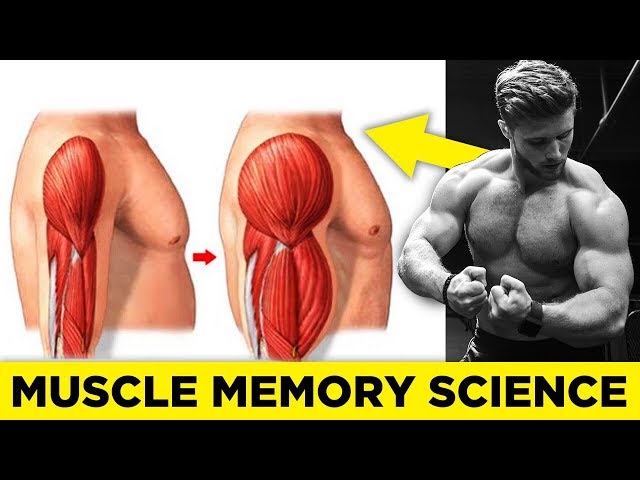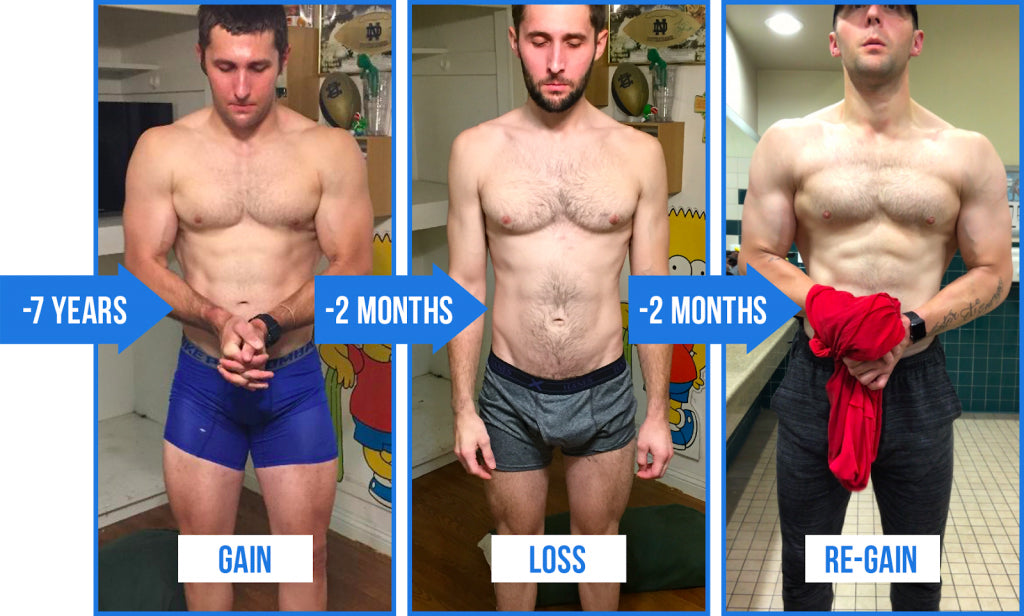Welcome to an informative article on muscle memory! Have you ever wondered how long it takes for muscle memory to kick in? Whether you’re a seasoned athlete or just starting out on your fitness journey, understanding the concept of muscle memory can greatly benefit your training progress. In this article, we will explore the timeline for muscle memory to develop and how it plays a crucial role in your overall muscle building journey. So sit back, relax, and let’s dive into the fascinating world of muscle memory! Have you ever wondered how long it takes for muscle memory to kick in? Maybe you’ve been hitting the gym consistently, trying to perfect your form, and wondering when all that hard work will start paying off. In this article, we’ll dive into the fascinating world of muscle memory and explore how long it typically takes to see results. Let’s get started!
This image is property of qph.cf2.quoracdn.net.
What Is Muscle Memory?
Muscle memory is a fascinating phenomenon that allows our muscles to remember specific movements once they have been repeated multiple times. This memory is stored in our brains and nervous system, allowing us to perform tasks more efficiently over time. It’s like your body’s built-in cheat code for learning new skills and movements.
So, how does muscle memory actually work? When you repeatedly perform a certain movement or exercise, your brain creates neural pathways that get stronger each time you do it. These pathways become more efficient, making it easier for your muscles to perform the movement without as much conscious effort.
Let’s break it down
Imagine learning how to ride a bike for the first time. At the beginning, you may struggle to keep your balance and pedal smoothly. However, with practice, your brain and muscles start to work together more effectively. Eventually, you’ll be able to ride a bike without even thinking about it – that’s muscle memory in action!
How Long Does It Take for Muscle Memory to Develop?
Now that we understand the basics of muscle memory, let’s dive into the big question – how long does it take for muscle memory to develop? The timeline for developing muscle memory can vary depending on a variety of factors, including the complexity of the movement, your level of experience, and how consistently you practice.
It depends on the movement
Simple movements, such as basic weightlifting exercises like bicep curls or squats, can start to develop muscle memory within a few weeks of consistent practice. More complex movements, such as advanced yoga poses or gymnastics routines, may take several months to a year to fully develop muscle memory.
Your experience level matters
If you’re just starting out with a new exercise or movement, it will likely take longer to develop muscle memory compared to someone who has been practicing for years. Beginners often need to focus more on mastering the basics before muscle memory can truly kick in.
Consistency is key
Consistent practice is essential for developing muscle memory. The more frequently you practice a movement, the faster your brain and muscles will adapt to it. Aim to practice your chosen exercise or movement at least a few times a week to see significant improvements in muscle memory.

This image is property of qph.cf2.quoracdn.net.
Tips for Developing Muscle Memory Faster
Now that we know how muscle memory works and how long it typically takes to develop, let’s explore some tips for speeding up the process. Whether you’re a beginner looking to improve your form or an experienced athlete striving to perfect your technique, these tips can help you develop muscle memory more efficiently.
Focus on quality over quantity
When practicing a new movement or exercise, focus on performing it correctly rather than rushing through multiple repetitions. Quality repetitions are key to developing muscle memory effectively. Take your time, pay attention to your form, and make each repetition count.
Utilize visual cues
Visual cues can be a powerful tool for developing muscle memory. Watching videos of proper form and technique can help reinforce the correct movement patterns in your brain. Consider recording yourself practicing the movement and comparing it to a professional demonstration to identify areas for improvement.
Incorporate visualization techniques
Visualization is a powerful tool for enhancing muscle memory. Before practicing a movement, take a few moments to visualize yourself performing it successfully. Imagine every detail of the movement, from the starting position to the finishing position. This mental rehearsal can help prime your brain and muscles for optimal performance.
Get feedback from a coach or trainer
Seeking feedback from a knowledgeable coach or trainer can accelerate the muscle memory development process. An experienced professional can provide valuable insights, correct any form errors, and offer tips for improving technique. Don’t be afraid to ask for guidance and constructive criticism to enhance your muscle memory.
Practice regularly and consistently
Consistent practice is crucial for developing muscle memory quickly. Set aside dedicated time each week to practice the movement or exercise you’re trying to improve. Aim for frequent, focused practice sessions to reinforce the neural pathways in your brain and muscles. Remember, practice makes perfect!

This image is property of i.ytimg.com.
The Benefits of Muscle Memory
As we’ve learned, developing muscle memory can significantly improve your performance in various physical activities. But what are the specific benefits of having well-developed muscle memory? Let’s explore some of the advantages that muscle memory can offer.
Increased efficiency
Muscle memory allows you to perform movements more efficiently, requiring less conscious effort and energy. This increased efficiency can help you conserve energy during workouts or sports competitions, allowing you to perform at your best for longer periods.
Enhanced coordination and precision
Developing muscle memory improves your coordination and precision in executing movements. You’ll find that you can perform tasks with greater accuracy, control, and fluidity, whether you’re lifting weights, practicing yoga, or playing a sport.
Reduced risk of injury
Strong muscle memory can help reduce the risk of injuries during physical activities. When your body is accustomed to performing a movement correctly, you’re less likely to make mistakes that could lead to strains, sprains, or other injuries. Proper form and technique are essential for preventing workout-related injuries.
Faster skill acquisition
Muscle memory accelerates the learning process for new skills and movements. Once you’ve developed muscle memory for a particular exercise or activity, you’ll find that you can progress more quickly, reaching higher levels of proficiency in a shorter amount of time.
Improved muscle conditioning
Regular practice and reinforcement of muscle memory can lead to improved muscle conditioning and strength gains. As your muscles adapt to specific movements, they become stronger, more resilient, and better equipped to handle the demands of your workouts.

This image is property of cdn.shopify.com.
Common Misconceptions About Muscle Memory
Despite its many benefits, muscle memory can be a misunderstood concept. Let’s debunk some common misconceptions about muscle memory and clarify how it actually works.
Myth: Muscle memory is stored in your muscles
Contrary to popular belief, muscle memory is not actually stored in your muscles themselves. Instead, muscle memory is a neurological phenomenon that involves the brain and nervous system. Your muscles themselves do not “remember” movements; rather, your brain forms neural connections that facilitate efficient movement patterns.
Myth: Muscle memory never fades
While muscle memory can last a long time, it is not permanent. If you stop practicing a particular movement or exercise, your muscle memory for that task can diminish over time. Consistent practice is necessary to maintain and strengthen muscle memory for optimal performance.
Myth: Muscle memory only applies to physical activities
While muscle memory is most commonly associated with physical activities like sports and exercise, it can also apply to cognitive tasks and skills. For example, musicians develop muscle memory for playing instruments, and dancers rely on muscle memory for choreographed routines. The principles of muscle memory can be applied to a wide range of activities beyond the physical realm.
This image is property of qph.cf2.quoracdn.net.
Conclusion
In conclusion, muscle memory is a fascinating aspect of human performance that can greatly improve your abilities in physical activities. Developing muscle memory takes time, practice, and consistency, but the benefits are well worth the effort. Whether you’re a beginner learning the basics or an experienced athlete honing your skills, understanding how muscle memory works can help you optimize your training and achieve your fitness goals. So keep practicing, stay focused, and watch as your muscle memory kicks in to enhance your performance like never before. Happy training!





